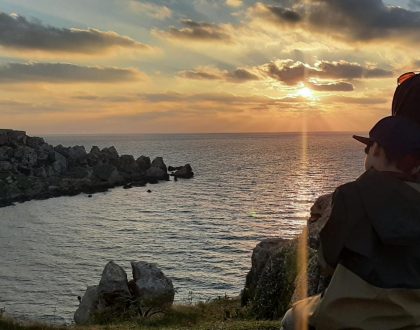Fear in Islam: Time (part 5)

by Abu Shama
Fear What Tomorrow Holds
The Future is Unknown
We do not know what will happen tomorrow let alone the rest of our lives. Do not procrastinate or defer things to the future. Today you are fine but tomorrow you may not. Many people have good health today, and then out of the blue, they have cancer, or some kind of debilitating illness which renders them not even half the person they were. It could be in our health or mental well-being, it could be in our environment. 10 years ago, the people of Syria never thought they would end up in a refugee camp or seeking asylum in another country. Do what you need to now. You never know what will happen.
Even A High Status is Not Guaranteed
In the past few years, we saw how many big Shayukh fall from the pulpit. Who was expecting this? Allah Almighty raises and lowers people. We should fear that. We never know, and therefore we have to keep asking Allah Almighty to keep us safe, to protect us from evil, to protect us from self-delusion, keep us on the straight path, from a bad and evil end.
Everyone is familiar with the Israelite tradition of Barsisa, the most pious worshipper of his time from Bani Israil. He was entrusted with a young girl by two brothers to be her caretaker to provide food and housing whilst they went war. Through little steps, Shaitan advised him with ‘good’ suggestions, and overtime he overstepped the boundaries of Allah Almighty one after another… in his last moment, before being executed, he renounced his faith and died without faith.
No one knows when death will knock on our door, or whether we will have the opportunity to repent, for how many procrastinators died before they could make repentance? How many people spent their life engaged in sin and only then to end their life wretchedly, forfeiting their Hereafter and departing with little hope for success or salvation?
So having fear of what may happen to us will help us seek protection from Allah. The honourable Prophet of Allah, Yusuf (peace be on him) used supplicated at the end of his story in the Qur’an:
“O My Lord! You have given me the kingdom and taught me the meaning of dreams. You are the Creator of the heavens and the earth. You are my Protector in this world and in the Hereafter, make me die as a Muslim and admit me among the righteous” [Yusuf: 12: 102].
This was a Nab’bi (Prophet) of Allah, who sought protection from Allah Almighty from losing faith and to die as a Muslim.
So this fear will help in protecting us from going towards sin. Do not go out to commit sins, fear that it might be the last thing we do, and then we will have to meet Allah Almighty with this?
Fear what might happen in the rest of your life, do not relax.
Fear Early Punishment in Dunya
The sins we have done, sometimes it is purified through small tribulations here and there. The Messenger of Allah Almighty (peace be on him) said:
“A believer does not undergo (the trouble) of running a thorn or more than that when Allah Almighty effaces his sins.” [Muslim]
At other times Allah Almighty purifies through an early punishment in Dunya rather than a punishment in the hereafter. Anas bin Malik narrated that:
The Messenger of Allah Almighty (peace be on him) visited a man who was so emaciated that he had become like a baby bird. He (peace be on him) said to him: “And did you not used to supplicate? Did you not used to ask Your Lord for sound health?” He said: “I used to say: “O Allah, whatever You are going to punish me with in the Hereafter, then hasten it for me in this world.” So the Messenger of Allah Almighty (peace be on him) said: “Glory is to Allah, you are not capable of that” – or – “you are not able to stand that. Don’t say that, say:
‘O Allah, give us good in this world, and good in the Hereafter, and spare us the punishment of the Fire.” [Tirmidhi]
We should not seek Allah Almighty to purify us, it’s better to seek his forgiveness, pardon and mercy.
In another narration.
A man came into the Mosque of the Prophet (peace be on him) overcome by sadness lamenting over his sins. ‘O my sins, O my sins’. The Messenger of Allah Almighty (peace be on him) said, ‘stop saying this, shall I teach you some that is better.’ Say this:
“Allahuma maghfiratoka awsaa min junoobi wa rahmatukha arja andey min amaley”
‘O Allah, Your forgiveness is greater than my sins and my hope in Your mercy is greater to me than my actions.” The man said this and the Messenger of Allah Almighty (peace be on him) said to him: “Repeat it again.” The man repeated it again then the Messenger of Allah Almighty (peace be on him) said to him: “Repeat it again.” The man did it [a total of four times] and the Messenger of Allah Almighty (peace be on him) said to him: “Arise for, indeed, Allah Almighty has forgiven you.” [Al-Hakim]
The Messenger of Allah Almighty (peace be on him) was building the mechanism in people to not fall into depression or despair. And should they find themselves in a state of overwhelm, how to get themselves out. He was teaching them how to be connected to Allah? How to rely on Allah? How to have healthy fear of Allah? How to have healthy hope in Allah.
Do not ask Allah Almighty to purify you of your sins. Do not say, ‘punish me in the Dunya’, – you cannot tolerate this here or anywhere. Do not ask Allah Almighty to bring His punishment in this world rather than the next even though it is better here than the Hereafter. The better thing to do is ask Allah Almighty for forgiveness and not to be taken to task. Allah Almighty teaches us instead.
“Our Lord, take us not to task if we forget, or make mistake. Our Lord; charge us not with a load such as Thou didst lay upon those before us. Our Lord, do Thou not burden us beyond what we have the strength to bear. And pardon us, and forgive us, and have mercy on us, You are our Protector. And help us against the unbelievers.” [Al-Baqarah: 2: 286]
Do not fall in to despair over your sins.
Let no wrong-action [dhanb] reach such proportions in your eyes that it cuts you off from having a good opinion of Allah, for, indeed, whoever knows his Lord considers his wrong-action as paltry next to His generosity. [Hikam 49]
Fear What Destiny Holds
Fear what destiny is hiding for you.
What does destiny have hiding for you? Are you going to be one who rejoices or one who is wretched? Where has your name been written? Reflect on this, has my name been written with the registry of the good people or has it been written in the registry of sinners. Am I a person who will die on imaan or disbelief? This fear is good, it is keeping us grounded and vigilant. There is no place for complacency.
Fear what destiny is hiding for you. This is a mechanism for healthy fear, to be better and do better. It keeps us humble, it keeps us in a state of hope in Allah, it keeps us on the straight and narrow, and it remaining steadfast.
In Summary
We have seen here that these fears are not blameworthy but rather praiseworthy. They are motivating us to be better, to have less burden in our heart and feel light.
People of high aspiration are like birds in a cage. They are people whose bodies dwell on earth, yet their hearts are connected to Allah Almighty.
“I am a bird of Allah’s garden and I do not belong to this dusty world.
For a day or two they have put me here in this cage of my own body.
I did not come here of my own,
I will soon return to my country, to my home.”
[Maullana Rumi]
O bird of heaven, come forward…
Anchor your eyes upon the heavens
Connect you spirit to the Divine Throne.
Come forward, do not be afraid….
Grow the spiritual wings of hope and fear.
Remove the shackles of illicit desires…
Free yourself from the cage of sins.
Take a deep breath,
Unfold your wings,
Catch the wind and take flight.
Don’t look back, only ahead,
Flap the wings of hope and fear… as one
Climb, climb higher,
Ascend to new heights which have no limit,
To new horizons which has no end,
And new realities beyond words.
O bird of heaven, come forward…
Allah’s garden awaits.
Allah Almighty awaits…
[Abu Shama]Part 5 – Based on a talk by Shaykh Haytham Tamim in December 2018 on the Adab an Nufus by al Harith ibn Asad al Muhasibi (781-857)
Recommended Posts

Can playing with children be an act of worship?
February 21, 2023

Ghazali on Tawbah (part 3)
June 03, 2022

Whomsoever Allah wishes good for…
February 08, 2022

